CD Reviews
Live Reviews
Coming Events
- Sep 10: Monster Magnet
- Sep 18 & 20: Children Collide
- Sep 22: Suzi Quatro
- Sep 23: Flo Rida
- Sep 24: NOFX & Bad Religion
- Oct 5: Marilyn Manson
- Nov 12-14: Sarah Blasko
- Nov 20: Seal
- Dec 4: Green Day
Live Review
KRAFTWERK - Manchester Velodrome (02 July 2009)
By: Mark Reed
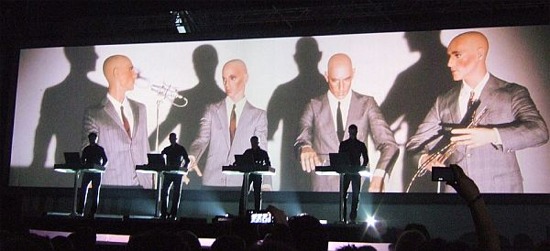
Spoken of reverently, akin to a techno Beatles, Kraftwerk are really no such thing. An ever-evolving set of like-minded musical workers, Kraftwerk have become a quietly impersonal enterprise. The clichés are legion: scientists in a musical lab, releasing the experiments that they feel are 'true', unemotional, and working detached from their environment.
Despite what you may have heard, Kraftwerk live is a thrilling experience: akin to a musical art installation that presents a set of images and ideas that work in a narrative context to create a vision that is more than the sum of the parts. In short, this is not a concert as such, but an idea that welds art, architecture, and the Akai.
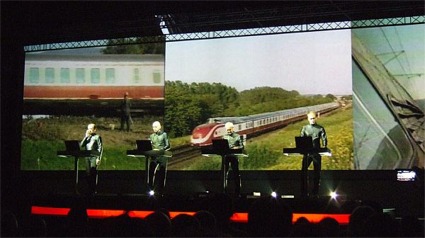
Aside from that, Kraftwerk – now consisting sole remaining founder member Ralf Hutter alongside longstanding musicians Fritz Hilpert and Henning Schmitz with newcomer Stefan Pfaffe – are a largely anonymous presence. There's no gestures, words – barely – or stage presence. These four men stand behind laptops, twiddle buttons, play keyboard parts, and co-ordinate a visual extravaganza that predates almost every other band on the planet with synchronized video.
Whilst Ralf appears the most active – looping and controlling vocals and playing melody parts, and Henning and Fritz are clearly the engine room controlling the sounds, rhythms, and body of the work, Stefan appears to not do anything musically (his role however, is far more pronounced that that: controlling the visuals, including some absolutely stunning effects at the shows finale).
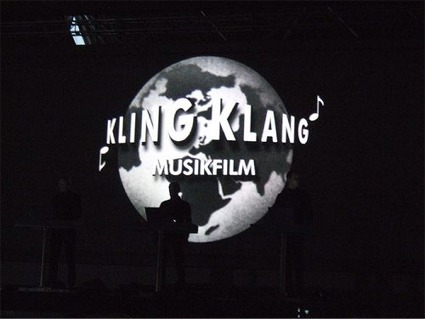
And the music? Oh yes, the music – born from a classical upbringing and welded to a timeless mastery of melody and unique, home-made electronic sounds that makes Kraftwerk both unique, timely, and immortal – is matched by minimal, clipped vocals and lyrics that operate ruthlessly: there's no joining words, no 'ands', no 'buts', just the adjectives, nouns, verbs, that describe a concept with an efficient minimalism. Whilst only two of these songs reference anything but an abstract technological or sociological concept – that is 'Computer Love' and 'The Model' – the vocabulary of a Kraftwerk show is not emotional, but conceptual – the framework within which everything else exists.
And it is by Kraftwerk standards, an almost perfect show. The music is immaculate – subtly updated, yet absolutely faithful to the original releases – and the presentation quite unlike anything else there is. At the time the band debuted this format – thirty years ago – they were operating on frighteningly unreliable equipment pushed to the limit of its abilities, and then, as now, they are always interested in how technology can help an artist achieve a vision, and then go off and do it.
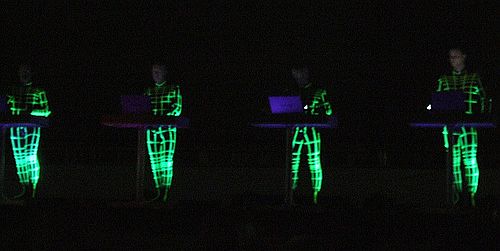
Each song follows a progression in the development of the idea, from the appropriate 'Man Machine' to the finale of 'Music Non Stop'. The music ebbs and flows, with nary a thought for tempo, or – for that matter – dance ability: instead it is about a thematic cohesion. Thankfully, the band are not nostalgic: and whilst there is plenty of old stuff, a third of the night comes from the under-rated, relatively recent 'Tour De France': and it is here that Kraftwerk show the most invention, effortlessly melding all the variants of the title songs together into a quarter-hour epic that is both fluid, human, and unique.
For when the opening chords of 'Etape' start, the cycle track around the Velodrome light up, and the concert suddenly changes into something far more inclusive – for the British Olympic Team lap the stage for the remainder of the songs, and at least one of the cyclists, the four riding in some kind of musical tandem ballet, claps his hands in time to the beat on the straits, which also encourages the audience.
Modestly more effective than the singer walking into the crowd during the last chorus, don't you think?
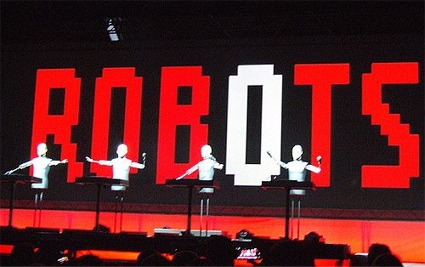
As the show progresses, the band are replaced by Robots. They have been doing this for 20 years, but it's still awesome. The finale – of 'Numbers'/'Computer World', 'Radioactivity', 'Vitamin', 'Aerodynamic' and 'Music Non Stop' – leaves the crowd speechless. As the visuals commence, and the audience dons their 3D glasses – there is a gasp that travels the auditorium as the reworked visuals encompass the audience in an effect that is unique, stunning, revelatory. It's beyond 3D, as the band are there in front of your eyes performing, and yet also, in a level of hyper-reality that is more real than real. The numbers leap out of the screen, I see other people here try to reach out and touch them, and the beats compound the stage during the elegant, stunning 'Radioactivity'.
Finally the closing, 10 minute 'Music Non Stop', condenses half of the 'Electric Cafe' album as each member of the band slowly enjoys a solo spot of various motifs and elements before taking a bow: at the end, it's Ralf Hutter alone who overplays the chords of 'Man Machine' as the song comes to a close, and leaves the audience alone with the concept as the machines perform the end of the song themselves – that makes you wonder, exactly how much of the set did the man perform, and how much of it was machine? Is it who plays what that matters? Or what is played? On the basis of tonight, where the sole remaining original member Hutter lead his orchestra of men in a living avant-garde art installation, one wonders whether Kraftwerk need ever be touched by human hands again in favour of a continuation by machine once the flesh itself is retired. Music Non Stop? Only the future knows.
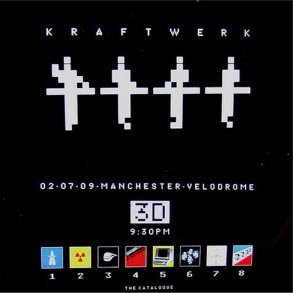
© 2010 BlowOut Indie Music Magazine Inc. All rights reserved.


